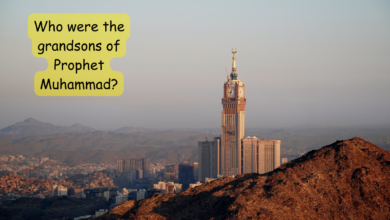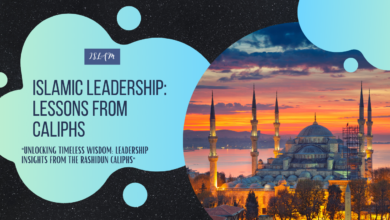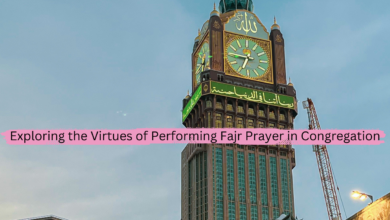The Prophet Muhammad’s Legacy in Islamic Festivals
Honoring the Prophet: His Influence on Islamic Festivals
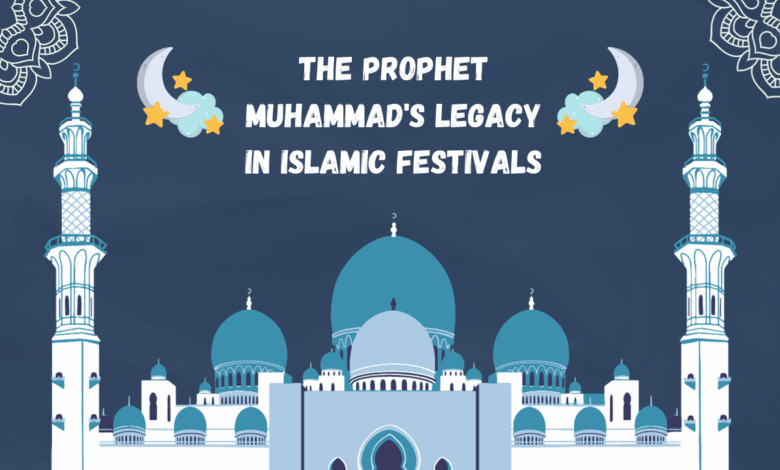
The Prophet Muhammad’s Legacy in Islamic Festivals
Prophet Muhammad was the last prophet of Islam and is highly revered by Muslims worldwide. His teachings and actions form the basis of Islamic faith, and his legacy plays a significant role in Islamic festivals.
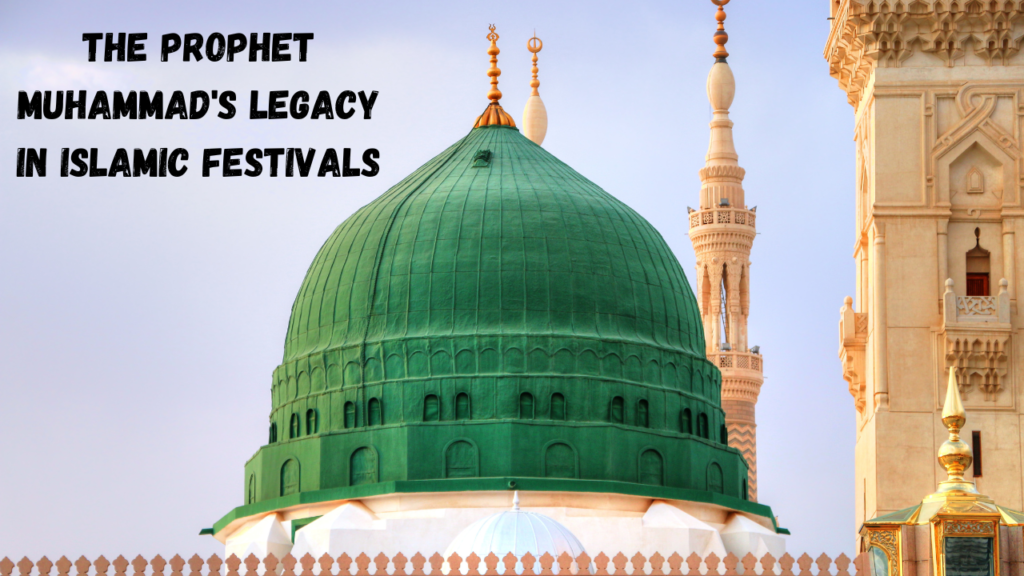
Introduction
Islamic festivals hold a special place in the hearts of Muslims worldwide. These celebrations are not just occasions for joy and festivities but also serve as a means to honor the life and teachings of the Prophet Muhammad (peace be upon him). The legacy of the Prophet plays a significant role in shaping the way Muslims observe their festivals, instilling a sense of spirituality, community, and gratitude.
Eid al-Fitr: The Festival of Breaking the Fast
Eid al-Fitr, often referred to as “Festival of Breaking the Fast,” is celebrated at the end of Ramadan, the holy month of fasting. This festival not only marks the end of a month-long period of dawn-to-dusk fasting but also carries with it the essence of the Prophet’s teachings. The Prophet Muhammad encouraged acts of charity and giving, and this is particularly emphasized during Eid al-Fitr.
One of the most important acts associated with Eid al-Fitr is the giving of Zakat al-Fitr, a form of charity given to the less fortunate. The Prophet Muhammad emphasized the importance of providing for those in need, especially during this time. By practicing this tradition, Muslims honor his legacy of compassion and generosity.
Also check.
- The Quranic View on Marriage and Family
- What are the core beliefs of Islam?
- When someone dies Islam?
- What year was Islam founded?
- What is Ashura Islam?
Eid al-Adha: The Festival of Sacrifice
Eid al-Adha, or the “Festival of Sacrifice,” commemorates the willingness of the Prophet Ibrahim (Abraham) to sacrifice his son, Isma’il (Ishmael), as an act of obedience to God’s command. While God intervened and provided a ram for the sacrifice instead, this event serves as a reminder of the importance of faith and submission to God’s will.
The legacy of the Prophet Muhammad in Eid al-Adha is evident in the act of Qurbani, the ritual sacrifice of an animal. This sacrifice symbolizes not only faith but also the willingness to share one’s blessings with others. Just as the Prophet emphasized the importance of helping the less fortunate, Muslims are encouraged to distribute a portion of the meat from their Qurbani to those in need, keeping the spirit of charity alive.
Also Check
- The Life and Times of Prophet Muhammad
- The Life and Legacy of Prophet Muhammad
- Eid al-Mawlid: Commemorating the Prophet’s Birth
- How many Wives did Prophet Muhammad (PUBH) have?
- A Temporary Residence of the Prophet Yunus /Jonah (PBUH)
Mawlid al-Nabi: The Celebration of the Prophet’s Birthday
Mawlid al-Nabi, or the celebration of the Prophet Muhammad’s birthday, is an occasion for Muslims to reflect upon and honor the life and teachings of the Prophet. While the celebration of Mawlid varies across cultures and communities, it is a time to gather, read stories of the Prophet’s life, and recite poetry and hymns in his praise.
The Prophet’s legacy of kindness, humility, and compassion is often the central theme during Mawlid celebrations. Muslims are encouraged to emulate his character and follow his example in their daily lives, reinforcing the importance of his teachings.
Laylat al-Qadr: The Night of Decree
Laylat al-Qadr, also known as the “Night of Decree” or the “Night of Power,” occurs during the last ten nights of Ramadan. It is believed to be the night when the Quran was first revealed to the Prophet Muhammad by the Angel Gabriel. This night holds immense spiritual significance for Muslims, and they spend it in prayer and supplication.
The legacy of the Prophet Muhammad in Laylat al-Qadr lies in his devotion to worship and reflection. Muslims follow his example by engaging in acts of worship, seeking forgiveness, and making heartfelt prayers on this auspicious night. The Prophet’s dedication to his faith serves as an inspiration for Muslims to draw nearer to God during this special time.
Conclusion
Islamic festivals are not merely occasions for revelry; they are deeply rooted in the legacy of the Prophet Muhammad (peace be upon him). Through acts of charity, sacrifice, reflection, and devotion, Muslims around the world honor and commemorate the teachings and character of the Prophet during these celebrations. His legacy continues to inspire Muslims to strive for spiritual growth, community cohesion, and a commitment to compassion and generosity, making these festivals not only joyous but also deeply meaningful.
FAQs about The Prophet Muhammad’s Legacy in Islamic Festivals
Who was Prophet Muhammad, and why is he significant in Islamic festivals?
Prophet Muhammad was the last prophet of Islam and is highly revered by Muslims worldwide. His teachings and actions form the basis of Islamic faith, and his legacy plays a significant role in Islamic festivals.
Which Islamic festivals are closely associated with the legacy of Prophet Muhammad?
The two major Islamic festivals linked to Prophet Muhammad’s legacy are Eid al-Fitr and Eid al-Adha. These festivals commemorate events in his life and emphasize his teachings of compassion, charity, and obedience to God.
How does Prophet Muhammad’s legacy influence the celebration of Eid al-Fitr?
Eid al-Fitr marks the end of Ramadan, the month of fasting. Prophet Muhammad’s legacy encourages Muslims to be charitable and generous during this time, making it a time for giving to the less fortunate.
What role does the Prophet’s life play in Eid al-Adha?
Eid al-Adha commemorates Prophet Ibrahim’s willingness to sacrifice his son, Isma’il, in obedience to God’s command. Prophet Muhammad’s life exemplified submission to God’s will, which is a central theme of this festival.
How is Prophet Muhammad’s legacy remembered during these festivals?
Muslims often read or listen to stories about the life of the Prophet during these festivals, emphasizing his moral and ethical teachings. His character and actions serve as a guide for how to lead a righteous life.
Are there specific rituals or prayers related to Prophet Muhammad during these festivals?
While there may not be specific prayers exclusively for Prophet Muhammad during these festivals, his name is often invoked in general prayers, expressing gratitude for his guidance and example.
What is the significance of the “Sunnah” (traditions of Prophet Muhammad) during Islamic festivals?
The Sunnah serves as a source of guidance for Muslims in various aspects of life, including festivals. Muslims often strive to emulate Prophet Muhammad’s actions and behavior as a way to draw closer to God during these occasions.
Do different Muslim cultures celebrate these festivals differently while still honoring Prophet Muhammad’s legacy?
While the core principles of the festivals remain consistent, different cultures may have unique customs and traditions associated with these celebrations. However, the reverence for Prophet Muhammad’s legacy remains a common thread.
How can non-Muslims show respect for Prophet Muhammad’s legacy during Islamic festivals?
Non-Muslims can show respect by being aware of the significance of these festivals to Muslims and by engaging in respectful dialogue. It’s also courteous to extend greetings and well-wishes to Muslim friends or acquaintances who are celebrating.
Is it appropriate for non-Muslims to participate in Islamic festivals to learn more about Prophet Muhammad’s legacy?
Yes, many Muslims welcome non-Muslims to participate or observe these festivals in a respectful manner. It can be an excellent opportunity to learn more about Islamic culture and the teachings of Prophet Muhammad. However, it’s essential to be mindful of cultural norms and customs.
